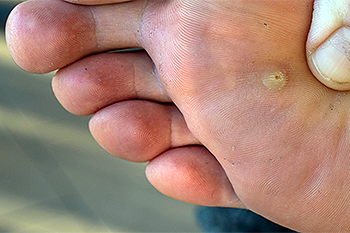
Plantar warts, though often benign, leave their mark on the soles of your feet with distinctive symptoms that merit attention. Typically emerging as flat or slightly raised growths, these warts exhibit a rough texture and may feature small black dots known as wart seeds, caused by clotted blood vessels. While the appearance is unmistakable, it is the discomfort that often draws attention. Plantar warts can cause pain or tenderness, especially while standing or walking, as the pressure on the wart exacerbates the discomfort. The surrounding skin may take on a calloused appearance, and the warts themselves can vary in size. Plantar warts thrive in warm, moist environments, making them frequent visitors to communal spaces like swimming pools or locker rooms. Recognizing these symptoms enables early identification and intervention, ensuring a more comfortable and expedited resolution of this common foot ailment. Plantar warts require the medical attention of a podiatrist, and if you have this ailment, it is suggested that you contact this type of doctor who can offer effective remedies for the accompanying pain and discomfort.
Plantar warts can be very uncomfortable. If you need your feet checked, contact one of our podiatrists from Sutera and Jones Surgical Podiatry. Our doctors will assist you with all of your foot and ankle needs.
About Plantar Warts
Plantar warts are the result of HPV, or human papillomavirus, getting into open wounds on the feet. They are mostly found on the heels or balls of the feet.
While plantar warts are generally harmless, those experiencing excessive pain or those suffering from diabetes or a compromised immune system require immediate medical care. Plantar warts are easily diagnosed, usually through scraping off a bit of rough skin or by getting a biopsy.
Symptoms
- Lesions on the bottom of your feet, usually rough and grainy
- Hard or thick callused spots
- Wart seeds, which are small clotted blood vessels that look like little black spots
- Pain, discomfort, or tenderness of your feet when walking or standing
Treatment
- Freezing
- Electric tool removal
- Laser Treatment
- Topical Creams (prescription only)
- Over-the-counter medications
To help prevent developing plantar warts, avoid walking barefoot over abrasive surfaces that can cause cuts or wounds for HPV to get into. Avoiding direct contact with other warts, as well as not picking or rubbing existing warts, can help prevent the further spread of plantar warts. However, if you think you have developed plantar warts, speak to your podiatrist. He or she can diagnose the warts on your feet and recommend the appropriate treatment options.
If you have any questions please feel free to contact one of our offices located in Media, Glen Mills, Riddle Memorial Hospital, and Concordville, PA . We offer the newest diagnostic and treatment technologies for all your foot and ankle needs.
